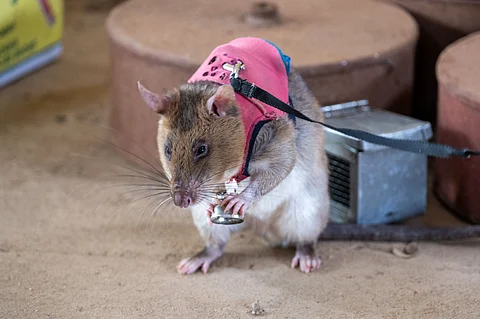

African giant pouched rats (Cricetomys ansorgei) can detect illegally trafficked wildlife items such as pangolin scales, elephant ivory, rhino horn and African blackwood, a new study showed.
The project was conducted by scientists at Belgian-based nonprofit APOPO’s Training and Research Headquarters in Morogoro, Tanzania. It aimed to establish proof-of-principle that rats could be trained to detect illegally smuggled wildlife items. Illegal wildlife trade is estimated to be worth up to $23 billion and is considered the fourth-largest transnational crime globally.
Published in the journal Frontiers in Conservation Science, the study found that seven rodents successfully identified illegal wildlife items — even when hidden among distractor items such as peanuts, washing powder and leaves.
The paper highlighted the conservation threat to species affected by illegal trade. “All eight species of pangolins (four in Africa and four in Asia) and all species of elephant and rhino are listed as threatened on the International Union for Conservation of Nature’s (IUCN) Red List of Threatened Species and on CITES’ Appendix I, indicating a high risk of extinction and heightened requirements for legal trade,” the study noted.
Pangolins, in particular, are the one of the world’s most heavily trafficked mammals, sought after for their meat, scales and purported medicinal properties. Between 2007 and 2014, the African elephant population declined by 30 per cent and over 11,000 rhinos were poached in the past decade alone.
While X-ray and other screening methods have limitations, the African giant pouched rats offer unique advantages similar to dogs, with an extensive range of olfactory receptors and large olfactory bulbs, the researchers found. These features enable them to detect and discriminate a wide variety of odours.
With a lifespan of 7-9 years, the rats are well-suited for training and detecting the scent of endangered animals. These rats have previously been deployed successfully to detect explosives in conflict zones and have helped identify tuberculosis pathogen TB mycobacterium for more than two decades.
The rats’ small size allows them to access areas where dogs may struggle. “Their unique capabilities for the screening of shipping containers, such as being able to navigate densely packed areas or be lifted to assess contents of sealed containers by screening ventilation systems,” the paper’s authors said.
In this study, the scientists trained 11 rats, seven of which accurately detected all four target wildlife items, though they were less consistent with elephant ivory. “These results provide the foundation to train rats for scent-detection of illegally trafficked wildlife to combat IWT,” the study concluded.
Beyond their acute sense of smell, these rats are cost-effective, have low maintenance requirements, work with multiple handlers and have a lifespan conducive to long-term training and use. These abilities of African giant pouched rats could help bolster existing wildlife screening technologies in the fight against illegal wildlife trafficking, the paper said.